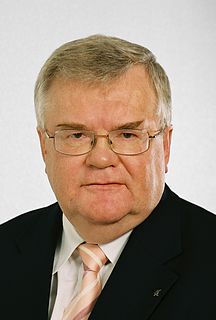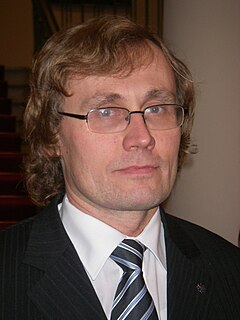| |||||||||||||||||||||||||||||||||||||||||||||||||||||
101 seats in the Riigikogu 51 seats were needed for a majority | |||||||||||||||||||||||||||||||||||||||||||||||||||||
| |||||||||||||||||||||||||||||||||||||||||||||||||||||
| |||||||||||||||||||||||||||||||||||||||||||||||||||||
Parliamentary elections were held in Estonia on 7 March 1999. [1] The elections proved disastrous for the Estonian Coalition Party, which won only seven seats together with two of its smaller allies. The Estonian Country People's Union, which participated the election on its own list, obtained seven seats as well.

Estonia, officially the Republic of Estonia, is a country in Northern Europe. It is bordered to the north by the Gulf of Finland with Finland on the other side, to the west by the Baltic Sea with Sweden on the other side, to the south by Latvia (343 km), and to the east by Lake Peipus and Russia (338.6 km). The territory of Estonia consists of a mainland and 2,222 islands in the Baltic Sea, covering a total area of 45,227 km2 (17,462 sq mi), water 2,839 km2 (1,096 sq mi), land area 42,388 km2 (16,366 sq mi), and is influenced by a humid continental climate. The official language of the country, Estonian, is the second most spoken Finnic language.

Estonian Coalition Party was an Estonian centre-right liberal political party. Founded in 1991 by Tiit Vähi, it disbanded in 2002. The party was an observing member of Liberal International from 1998 on. It had a contacts with parties like Latvian Way and participated in the ruling coalition of 1995-1999. A party mostly uniting former (urban) nomenklatura and other Soviet era officials, it was closely allied with the Party of Rural People, which, however, represented more populist, centre-left ideology.

The People's Union of Estonia was a political party in Estonia, its last leader being Margo Miljand.
Contents
The programme of Mart Laar’s government was signed by Pro Patria Union, Reform Party, Moderates and People’s Party. The latter two merged soon after, so Mart Laar’s second government is widely known as Kolmikliit, or Tripartite coalition. Notwithstanding the different political orientation of the ruling parties, the coalition stayed united until Mart Laar resigned in December 2001, after Reform Party had broken up the same coalition in Tallinn municipality, making opposition leader Edgar Savisaar new Mayor of Tallinn. After resignation of Laar, Reform Party and Estonian Centre Party formed a coalition that lasted until next parliamentary election, 2003.

Mart Laar is an Estonian politician and historian. He served as the Prime Minister of Estonia from 1992 to 1994 and from 1999 to 2002. Laar is credited with having helped bring about Estonia’s rapid economic development during the 1990s. He is a member of the Pro Patria party.
The Pro Patria Union was a national conservative political party in Estonia. The party was founded on 2 December 1995 from a merger of the Estonian National Independence Party and the Pro Patria National Coalition.

The Estonian Reform Party is a liberal political party in Estonia. The party is led by Kaja Kallas and has 34 members in the 101-member Riigikogu, making it the largest party in the legislature.













